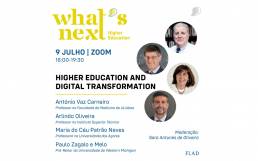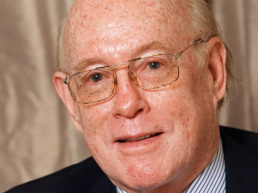What impact will the changes made by Higher Education institutions have in the future in order to adapt to the pandemic? Are the changes permanent? How do these affect students and universities?
With no light at the end of the tunnel, four members of the academy gathered this Thursday, July 9, to discuss the future of Higher Education in the framework of the COVID-19 pandemic, in the fourth edition of FLAD’s webinars: What’s Next for Higher Education and Digital Transformation.

Can distance learning become the norm rather than the exception? One thing the speakers agree on: the world has changed. It remains to be seen how.
“The world has changed. And it has changed forever. In the world of academia, we have to understand what is happening in the world.” – António Vaz Carneiro, Director of the Institute of Preventive Medicine and Public Health of the Faculty of Medicine of the University of Lisbon.
António Vaz Carneiro anticipates that, in a world where the offer of online courses increases significantly, the competition also comes from the largest universities in the world, which will force a change in the approach of universities, that have to focus more on students. But there are courses, such as Medicine, that will require deeper changes due to the mandatory face-to-face practical teaching.
“The question that arises in the future is not so much what the university wants to do, but what the system itself allows or does not allow the university to do.” – António Vaz Carneiro.
Maria do Céu Patrão Neves, Professor of Ethics at the University of the Azores, which was an MEP, argues that the immediate response of Higher Education was good because it had the technical capacity to do so, but if these changes are permanent, there is much more to change than just creating online platforms and providing distance learning.
“If we perhaps opt for an exclusive online model and not a blending, in that case, I think that the contact with the student is not of the same nature. (…) As teachers, we lose our pedagogical resources, which go beyond the verbal: our posture, the student’s posture, the look, the feeling.” – Maria do Céu Patrão Neves.
Arlindo Oliveira, Professor at the Instituto Superior Técnico, also sees with great difficulty the maintenance of quality teaching in a context in which classes become completely at a distance.
“Distance learning is a very pale copy of face-to-face teaching that takes place in good academy, in a good university. Conviviality (…) is an absolutely essential thing that is part of the student’s education. (…) Let us not be naive to think that this model purely from a distance can replace the physical model.” – Arlindo Oliveira.
On the other side of the Atlantic, the changes are already profound, but there is still much to be decided. Paulo Zagalo-Melo, Dean for Global Education at Western Michigan University explained that in 4 days, his university passed 4,500 face-to-face subjects to the online regime. Has it transformed into a completely online teaching regime? Professor Paulo doesn’t think so. But the online will no longer be just an add-on.
“When we compare the online total with the total face-to-face teaching formats we had lower costs for the online. But in the future, almost all programs will have mixed subjects. (…) What will not happen again is a return of the online to being an accessory.” – Paulo Zagalo-Melo.
Related Posts
March 25, 2025
Note of Condolence – Charles Buchanan (1934-2025)
March 24, 2025
Applications Open: FLAD/Saab Visiting Professor at UMass Lowell 2026
Portuguese professors can apply to…
March 17, 2025
FCT and FLAD sign new protocols with the University of California
The objective is to promote academic…


